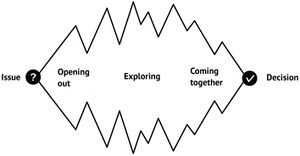Collective guidelines: Difference between revisions
| (One intermediate revision by the same user not shown) | |||
| Line 64: | Line 64: | ||
* methods class by Lídia around Coc's, as part of SI23 Quilting infrastructures: https://pad.xpub.nl/p/si23-070224 | * methods class by Lídia around Coc's, as part of SI23 Quilting infrastructures: https://pad.xpub.nl/p/si23-070224 | ||
* [https://hackmd.io/@yHk1snI9T9SNpiFu2o17oA/Skh_dXNbE?type=view A mega list of handbooks and toolkits for groups working without top-down management from social movements to workplaces] | |||
[[Category:protocol]] | [[Category:protocol]] | ||
Latest revision as of 21:02, 9 October 2024


references lists and sources
- https://www.intersectionsofcare.net/
- Rita Graça's grad project 'Networks of Care' : https://hub.xpub.nl/networksofcare/mediawiki/index.php?title=Main_Page , with particular attention to common sections https://hub.xpub.nl/networksofcare/mediawiki/index.php?title=Category:Archiving
- Post Meritocracy Manifesto: https://postmeritocracy.org/
- Contributor Covenant: https://www.contributor-covenant.org/
- Hacking with Care: https://hackingwithcare.in/about-2/
- Pirate Care Syllabus: https://syllabus.pirate.care/
- Wages Against Housework: https://warwick.ac.uk/fac/arts/english/currentstudents/postgraduate/masters/modules/femlit/04-federici.pdf
roles & hierarchies, power distribution, labor distribution, authorship
- https://toolkit.press/introduction.html
- many refs!
hand signals
- https://media.studycollaboration.com/pdfs/hand_job_poster_1.pdf
- https://studycollaboration.com/practice/hand-signals
question of audience
alt-text as poetry
decision making
- https://www.seedsforchange.org.uk/groupagree + PDF: https://www.seedsforchange.org.uk/groupagree.pdf
- consensus based decisions: https://www.seedsforchange.org.uk/shortconsensus#process
- decision making structures: https://wiki.vvvvvvaria.org/images/0/02/Decision_making_structures.pdf (source: https://www.vernalproject.org/)
learning to love meetings
- https://starhawk.org/pdfs/Empowerment_Five-Fold-Path.pdf
- talking stick
restorative practices, conflict resolution, repair
- Restore Cph: https://genopretkbh.dukop.dk/en/ ("We are a small network of people interested in restorative circles anchored in Copenhagen.")
- https://readymag.website/diponti/communityrestorativepractices/
community/collective/membership guidelines/Coc examples
- https://hackerspace.design/
- https://lurk.org/TOS.txt
- https://constantvzw.org/wefts/orientationspourcollaboration.en.html
- https://varia.zone/en/pages/membership-guidelines.html
- eldritch.cafe https://eldritch.cafe/about
- Libre Graphics Meeting https://libregraphicsmeeting.org/2020/en/codeofconduct.html
- Transmediale https://transmediale.de/en/page/code-of-conduct
- Netherlands Code of Conduct for Research Integrity https://www.nwo.nl/sites/nwo/files/documents/Netherlands%2BCode%2Bof%2BConduct%2Bfor%2BResearch%2BIntegrity_2018_UK.pdf
about care
'Care, a political notion' by Pirate Care (https://syllabus.pirate.care/)
Caring is not intrinsically “nice”, it always involve power relations. Processes of discipline, exclusion and harm can operate inside the matrix of care. Care labour holds the capacity to disobey power and increase our collective freedom. This is why when it is organised in capitalist, patriarchal and racist ways, it does not work for most living beings. We are in a global crisis of care. There are no wrong people. Yet, caring for the “wrong” people is more and more socially discouraged, made difficult and criminalized. For many, the crisis of care has been there for a very long time. Caring is labour. it is necessary and it is skilled labour. Care labour is shared unfairly and violently in most societies, along lines of gender, provenance, race, class, ability, and age. Some are forced to care, while some defend their privilege of expecting service. This has to change. Caring labour needs full access to resources, knowledge, tools and technologies. When these are taken away, we must claim them back.
See also
- methods class by Lídia around Coc's, as part of SI23 Quilting infrastructures: https://pad.xpub.nl/p/si23-070224
- A mega list of handbooks and toolkits for groups working without top-down management from social movements to workplaces
